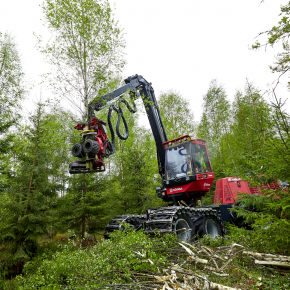
Remain vigilant when sourcing your timber – Sodra
 Jeremy English, UK Sales Director at Södra, explores why, more than ever, it is so important to source and use the very best, sustainable timber.
Jeremy English, UK Sales Director at Södra, explores why, more than ever, it is so important to source and use the very best, sustainable timber.
“With more and more houses being built, and timber becoming an increasingly popular and necessary building material, it is crucial to be sure of the provenance and quality of the timber you are using.
The sustainability benefits timber offers are well known, meaning its popularity and demand are only likely to increase. A report from the Royal Academy of Engineering even suggests that building a new generation of timber buildings would help the UK meet Paris Agreement sustainability targets.
With increasing popularity, however, comes the threat of illegal logging, deforestation, and a potential influx of unsustainable, poor quality timber.
Halting deforestation, protecting nature and fighting climate change
The EU Timber Regulation has been one of the key defences against this. Encouragingly, it has largely helped to prevent illegal timber from entering the EU market and helped international efforts to halt deforestation, protect nature and fight climate change.
As recently as 2016, however, a Swedish Court ruled that Almtra Nordic was breaching the EUTR for importing tropical wood from Myanmar without properly assessing the risk that it had been logged illegally.
The case set an important precedent that companies, under EU Regulation, are required to fully trace their supply chains, right back to where the timber has been harvested. It’s an important reminder that quite rightly, chain of custody is being closely monitored.
Thankfully, it’s likely the UK will remain committed to EU FLEGT following Brexit, although it will be known by its UK name: Timber and Timber Products Regulation. It remains vital, however, that those buying, and sourcing timber remain vigilant.

Guarantee supply assurance in uncertain times
As well as sustainability and quality, you need to guarantee supply assurance in uncertain times. You need to be sure, post-Brexit, that you can source the right, sustainable wood in the right quantities at the right time.
You can do this by being a responsible buyer. Be aware of where your wood is coming from and make note of the forestry company’s sustainability policy.
Are they reputable? Do they have ownership of their supply chain, as per EU Timber Regulation, from seed to sapling, to harvesting and beyond?
Be mindful forest-owners with complete end-to-end control of their supply chain and a strong UK distribution network are more likely to be insulated by fluctuations in timber supply, and therefore able to offer greater supply assurance.
Sustainability comes hand-in-hand with quality
Sustainability comes hand-in-hand with quality, so be sure to ask your merchant for the appropriate chain of custody certification.
This will have been given to your merchant by the importers. It should be the obligation of responsible roofers to check that the timber they are purchasing originates from a sustainable source. Crucially, if it is PEFC and FSC-certified then you can be confident of its sustainability credentials.
Most timber will carry certification and grade marks. If there are no grade marks, the timber must not be used for structural purposes. If you have any doubts, note the grade stamp details and contact the UKTGC.
You should also check that the timber you are purchasing has an average moisture content of 20 per cent or less, with no single piece exceeding 24%.
The benefits of using timber with the correct moisture content are numerous: greater strength, easier handling and transportation, better machining, and less shrinking and distortion, to name just a few.
For these reasons, it’s important to be sure that the merchants you are purchasing from are trusted and reputable. All reputable merchants will carry chain of custody and typically stock both British Standard and/or Type A grades of tile batten.

Why is this important?
As I say, sustainability and quality come hand-in-hand. If your timber has been slow-grown to full maturity then not only has it fully benefited the environment, but it will be straighter and stronger, less prone to twisting or bowing, and have fewer knots and imperfections.
Quality timber provides you with the reassurance that what your building is high-quality and going to last. Failure to use quality, sustainable timber might mean that it rots, and tiles may not fix to timber battens properly, for example.
There is a direct correlation between quality of batten and the service life of a roof. If you don’t invest properly in the foundations of a project, then what’s on top will not perform properly.
Moreover, some top tile manufacturers will only warrant their product if it has been fixed on British Standard batten. They recognise the importance of using top quality timber – it’s what underpins their warranty.
One of the crucial reasons why the British Standard was introduced was to provide peace of mind and a benchmark for quality that roofers, housing developers, and tile manufacturers, for instance, can rely on.
Being a responsible purchaser of timber can not only help you guarantee a first-class job but enhance your reputation and restore consumer confidence. Higher quality timber also means less cast-offs and wastage – all of which bolsters your bottom line.
Vitally, if you’re working on a project that is reliant on ethical funding, you will need to provide proof of sustainability. It’s therefore the roofing manufacturer’s responsibility to produce documentation that demonstrates the use of fully compliant, PEFC and FSC-certified timber.
Failure to do so risks the funder saying, ‘that’s not the standard we approved’, and requesting that the non-compliant timber is removed.
We’re entering a really exciting time for timber and I truly believe in its ability, amongst other things, to help fix the UK’s housing crisis and meet its sustainability targets.
But we can only achieve this if the right, high quality, sustainable timber is used. Take care when sourcing your timber. It won’t let you down if you do.”
Address: Södra Wood Ltd, Unit 18/19, Cirencester Office Park, Tetbury Road, Cirencester GL7 6JJ
Phone: +44 (0)1285 646000
Fax: +44 (0)1285 646020
Email: ukinfo@sodra.com
Visit Supplier's page
Latest news

28th March 2025
Ideal Heating Commercial announces 10-year warranty on Evomax 2 boiler
Evomax 2, the UK’s number one selling commercial wall-mounted boiler from Ideal Heating Commercial, is now available with a 10-year warranty.
Posted in Articles, Building Industry News, Building Products & Structures, Building Regulations & Accreditations, Building Services, Facility Management & Building Services, Heating Systems, Controls and Management, Heating, Ventilation and Air Conditioning - HVAC, Innovations & New Products, Pipes, Pipes & Fittings, Plumbing, Retrofit & Renovation, Sustainability & Energy Efficiency, Videos
28th March 2025
FLIR Si1-LD Acoustic Imaging Camera for Compressed Air Leak Detection
FLIR, a Teledyne Technologies company, introduces the Si1-LD, an industrial acoustic imaging camera that brings faster and more accurate compressed air leak detection to those operating on a modest condition monitoring budget.
Posted in Acoustics, Noise & Vibration Control, Articles, Building Industry News, Building Products & Structures, Building Services, Facility Management & Building Services, Information Technology, Innovations & New Products, Retrofit & Renovation, Sustainability & Energy Efficiency, Thermal Imaging and Monitors
28th March 2025
LIFTEX 2025 Seminar programme announced
Registration has opened for LIFTEX 2025. Now in its 37th year, LIFTEX 2025 is the UK’s only dedicated exhibition for the lift, escalator and access industry and takes place only once every three years.
Posted in Access Control & Door Entry Systems, Accessibility, Articles, Building Industry Events, Building Industry News, Building Products & Structures, Building Regulations & Accreditations, Building Services, Exhibitions and Conferences, Facility Management & Building Services, Health & Safety, Retrofit & Renovation, Security and Fire Protection, Seminars
28th March 2025
MCRMA welcomes ArcelorMittal UK to membership
A UK division of the global steelmaking business ArcelorMittal has become the latest new member of the MCRMA, the industry association representing the metal building envelope sector.
Posted in Articles, Building Associations & Institutes, Building Industry News, Building Products & Structures, Building Systems, Cladding, Facades, Posts, Restoration & Refurbishment, Retrofit & Renovation, Roofs, Steel and Structural Frames, Walls
 Sign up:
Sign up: